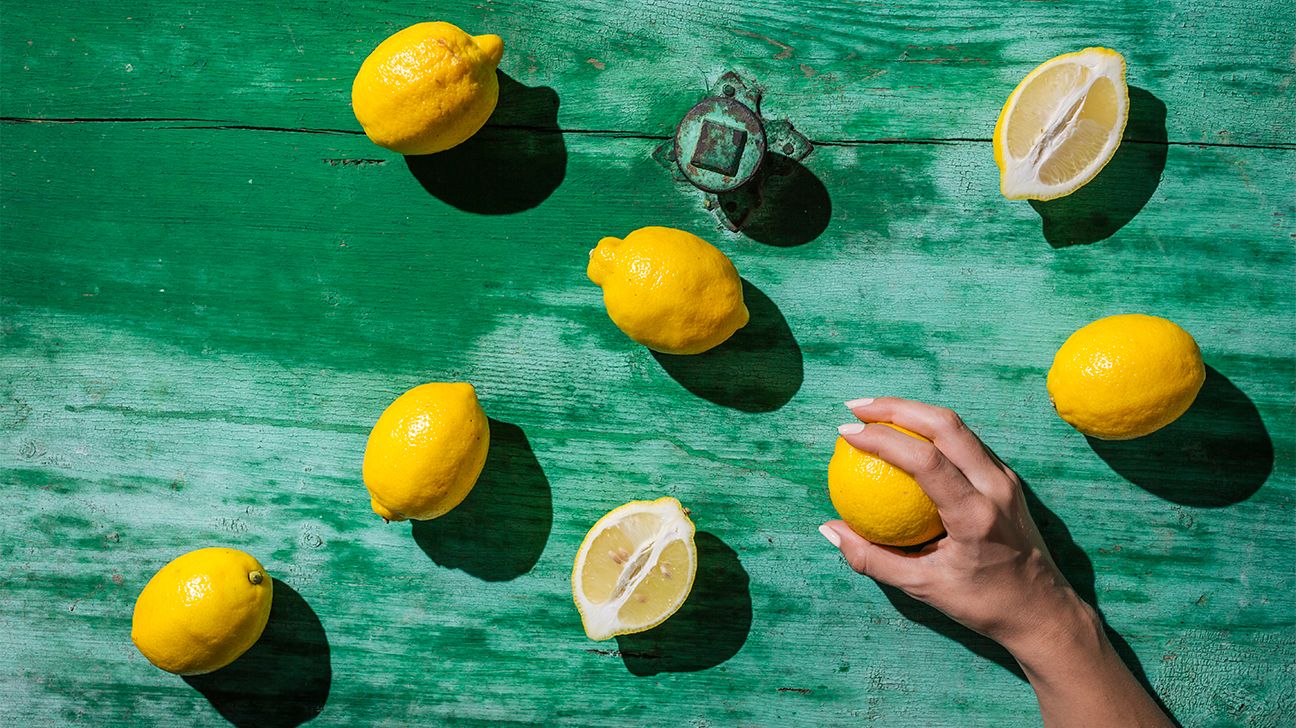It ain’t a load of pulp fiction! Lemons are citrus superheroes. They’re packed with potential health benefits, and they may even be good for diabetes!
Is lemon good for diabetes?
All parts of the lemon can help keep blood sugar levels in check. Studies show lemons, especially lemon peels, can help block enzymes that are associated with type 2 diabetes.
Beep, beep, beep! Back this lemony bus up a sec. Let’s breakdown some basics first.
Glycemic glossary
- Glycemic index (GI): how much an individual food is expected to increase blood sugar
- Glycemic load (GL): how much a food is expected to increase blood sugar when the planned portion size is also considered
Fast facts
- Sugary foods often have a higher GI and GL.
- Foods with a lower GL can help balance your blood sugar, insulin, and energy.
- A food’s fiber or other nutrients can bring down its GL.
What’s up with insulin?
Sugar kick-starts your body’s insulin response. Insulin helps your body bring sugars into your cells. Folks with diabetes have a harder time doing this. This can cause various health issues.
Lemon benefits depend on:
- what type of diabetes you have (T1D or T2D)
- how much lemon is consumed
- what kind of lemon is consumed
- other lifestyle or health factors
Lemons are diet-boosting dynamos! Here’s why.
Nutritional profile
One small, raw lemon has about:
- 17 calories
- 5.5 grams of carbs
- 1.5 grams of sugars
- 2 grams of fiber
- 52 grams of water
Lemons also have tons of nutrients that do a body good, including:
- vitamin C
- vitamin D
- beta carotene
- folates
- calcium
- phosphorus
- antioxidants like polyphenols and flavones
Lemons are on the American Diabetes Association’s list of diabetes superfoods. Oranges also made the cut. But lemons are lower in sugar, and lemon peels seem to have more anti-diabetes potency.
The proof is in the lemon pudding
The promising connection between lemons and diabetes is backed by science. Research shows:
- Compounds in citrus fruit extracts may combat obesity.
- Certain citrus flavonoids inhibit starch digestion. This may reduce sugar absorption in the intestines.
- Lemons may slow the conversion of sugars in other foods when eaten together.
- Citrus fruits contain soluble fiber, which can lower glucose levels.
Type 1 diabetes
Type 1 diabetes (T1D) is a condition originating in the pancreas. With T1D, the body can’t produce insulin.
Lemons can’t cure T1D, but citrus can still be beneficial because it can help stabilize blood sugar. Lemmies can also contribute to a lifestyle that wards off obesity, heart disease, and other conditions that can aggravate T1D.
Type 2 diabetes
The body still makes insulin with type 2 diabetes (T2D). But it’s not used properly. This makes blood sugar and insulin hard to keep in check.
Lemons may be particularly powerful for peeps with T2D. One study found that lemon peels may prevent sugar absorption into the blood. They can also lower glucose levels, reduce insulin resistance, and regulate your metabolism.
Another study found that citrus fruits helped lower obesity in rodents. Since obesity is linked to T2D and other adverse health conditions, this could be an important reason to show lemons some love.
Keep it balanced
Prevention of T2D requires more than a bunch of lemons. Enjoy a healthy lifestyle to keep your blood sugar in check. Eat well, move your bod, hydrate, and get plenty of sleep.
The Food and Drug Administration (FDA) considers lemons to be generally recognized as safe (GRAS). But there are a few sour side effects. Be aware that:
- Lemons are acidic. They may erode tooth enamel or set off heartburn.
- Lemons can have a diuretic effect. (Vitamin P, am I right?)
- In excessive quantities, the oxalates in lemon peels could lead to kidney stones.
Modify your lemon intake as needed. Contact your healthcare provider if you have more severe side effects.
In Lemons We (Ci)Trus(t)
Lemons are fantastic, but you should still check with your doctor before adding them to your diet.
Lemons are versatile AF. Srsly, you’ll be ZFFs (zest friends forever) in no time! Here are some ways to get the tart tastes flowing.
Zest ’em, juice ’em, pulp ’em, peel ’em
There’s no shortage of tasty ways to incorporate lemony goodness into your eats and drinks.
- Give your lemonade a makeover. Infuse still or bubbly water with lemon slices. If you want a little sweetness, experiment with sugar-free sweeteners. You can also add in low GL fruits (e.g., strawberries or plums).
- Add fresh lemon zest to rice, pasta, or vegetables.
- Put a shaker of powdered lemon zest on your dining table. Or add some to your favorite seasoning mix.
- Substitute lemon juice for vinegar in your salad dressing.
- Squeeze the juice and pulp of a lemon into your favorite soup.
- Stir lemon juice into yogurt, hummus, or salsa for a new spin on some classic dips.
- Substitute lemons for oranges in fruit salads, sorbets, or baked goods.
- Top your fish or chicken with ultra-thin lemons slices.
- Use lemon juice to marinate poultry, seafood, or veggies.
Lemons can be a healthy and tasty part of anyone’s diet. They can even be good for you if you have diabetes. Add lemons to your water or get creative with citrusy cuisine. Pucker up and start squeezing! 🍋


